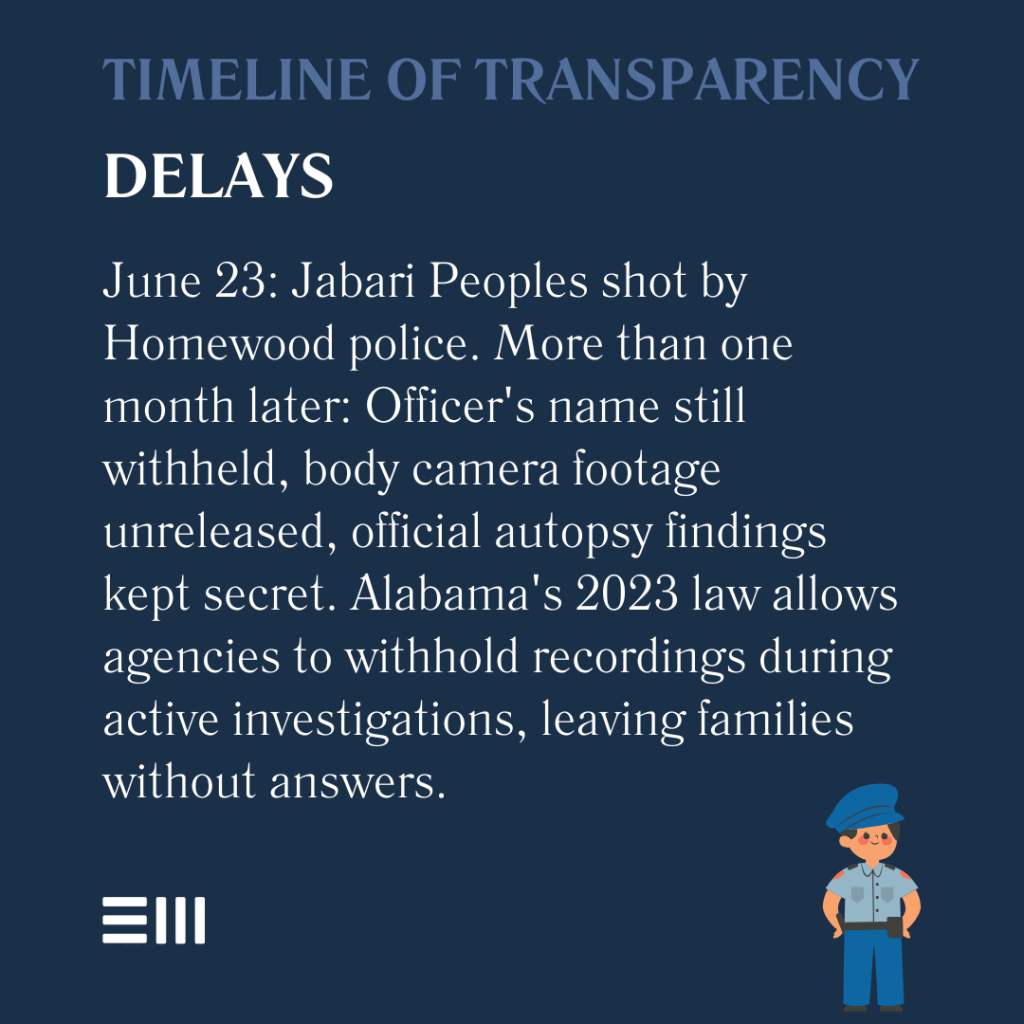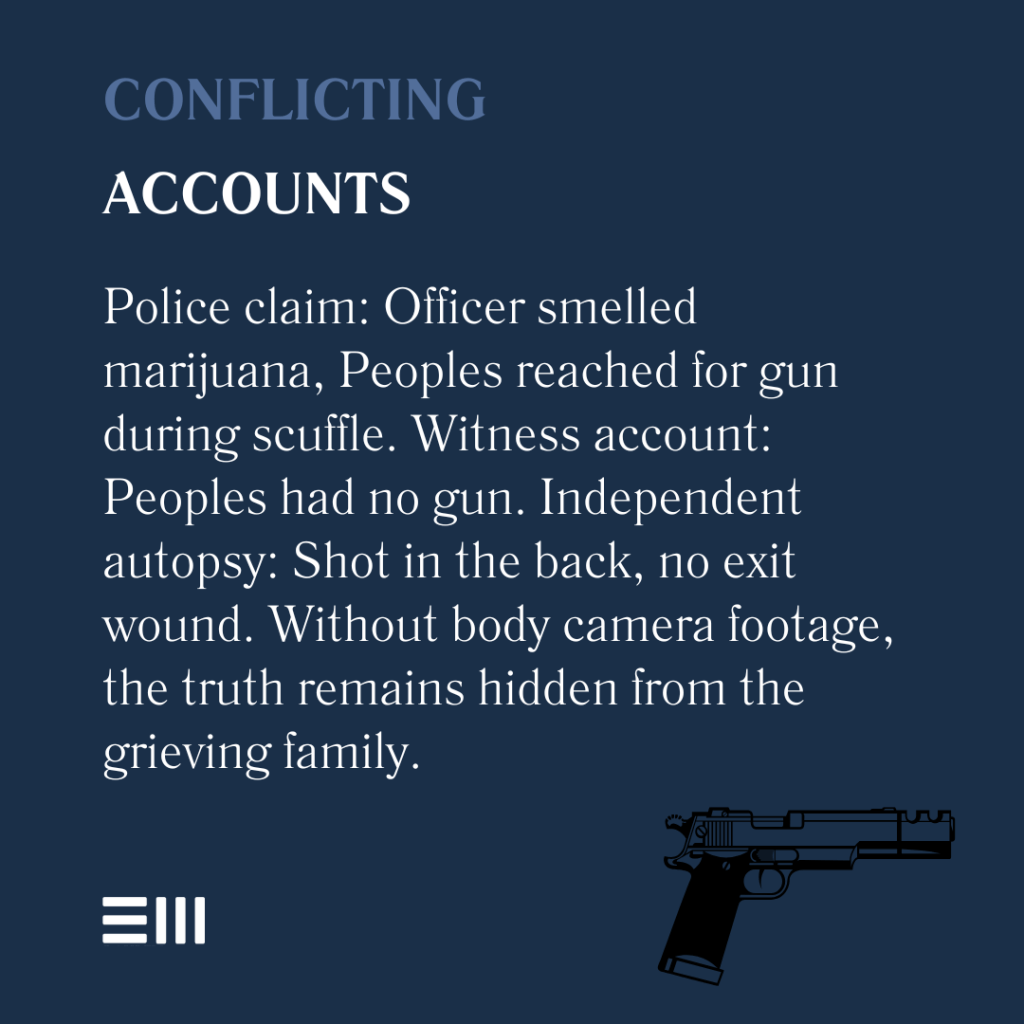
An independent autopsy has revealed that 18-year-old Jabari Peoples was shot in the back by a Homewood police officer on June 23, according to attorneys representing his family.
The finding, announced at a Tuesday news conference by civil rights attorney Ben Crump, intensifies calls for transparency in a case that has left a Birmingham-area family searching for answers about their son’s death.
The Shooting Incident
The fatal encounter occurred in the parking lot of a soccer field in Homewood, an affluent Birmingham suburb. According to police accounts, an officer approached Peoples after detecting the smell of marijuana.
Authorities claim the officer shot Peoples after the teen reached for a gun during a scuffle. However, a friend who witnessed the incident has contradicted this account, stating that Peoples was not armed.
More than a month after the shooting, crucial details remain undisclosed. The officer’s name has not been released, and neither the police body camera footage nor the county’s official autopsy findings have been made public.
Independent Autopsy Findings
The private medical examiner from Georgia, whose name was not disclosed, found that Peoples was shot in the back with no exit wound. Without access to the bullet or body camera footage, Crump noted that the preliminary autopsy remains inconclusive.
“This family is grasping at straws trying to get the answers. And it is not fair, it is not right and it is not just,” Crump stated during the news conference.

The Fight for Transparency
Despite police assertions that the officer’s body camera “clearly captured” the shooting details, the Alabama Law Enforcement Agency (ALEA) has refused to release the footage, citing an ongoing investigation.
This decision is supported by a 2023 state law (HB41) that allows agencies to withhold recordings if disclosure would affect an active investigation.
Homewood Mayor Alex Wyatt added his voice to calls for transparency on Monday, urging the state agency to release the footage while noting he lacked the authority to do so himself. However, the family’s attorneys pushed back, arguing that the mayor could legally view the video and share his observations with the public or release official police incident reports.
“Just show us what happened to our child, please,” pleaded William Peoples, Jabari’s father, during the emotional news conference.

Legal Framework and Civil Rights Implications
From a civil rights and personal injury law perspective, this case highlights several critical issues in Alabama:
- Police Accountability: The delayed release of body camera footage raises questions about transparency in officer-involved shootings. While the 2023 law provides investigative protections, it also creates potential barriers to public accountability.
- Use of Force Standards: Alabama law requires that police use of deadly force be objectively reasonable under the circumstances. Shooting someone in the back typically raises serious questions about whether the officer faced an imminent threat.
- Civil Remedies: Beyond any criminal investigation, the family may pursue civil claims under federal civil rights law (42 U.S.C. § 1983) for excessive force and wrongful death. Alabama’s wrongful death statute uniquely allows only punitive damages, not compensatory damages.
The conflicting accounts between police and the civilian witness underscore the importance of independent evidence, particularly body camera footage, in determining what actually occurred.
The Broader Context
This case occurs against a backdrop of heightened scrutiny of police use of force, particularly in communities of color.
The involvement of Ben Crump, who has represented families in numerous high-profile police shooting cases nationally, signals the potential significance of this case beyond Homewood.
The delay in releasing information has compounded the family’s grief and raised community concerns about transparency.
In cases involving police shootings, prompt disclosure of evidence can help maintain public trust while still protecting the integrity of investigations.
Moving Forward
As the investigation continues, several key questions remain:
- What does the body camera footage actually show?
- Why was the officer’s name withheld while the victim’s friend who contradicted police was presumably identifiable?
- What specific factors are preventing the release of the official autopsy?
- How long will the family have to wait for basic answers about their son’s death?
For families facing similar tragedies, understanding their rights is crucial. Alabama law provides various avenues for seeking justice, including internal police investigations, criminal proceedings against officers, and civil lawsuits for constitutional violations.
However, navigating these systems while grieving requires experienced legal guidance.
The Peoples family’s quest for answers continues, highlighting the delicate balance between protecting ongoing investigations and providing grieving families with the transparency they deserve.
As this case develops, it may well influence how Alabama handles police accountability and transparency in future officer-involved shootings.
Let Justice Roll, With Baxley Maniscalco
If your family has been affected by police misconduct, excessive force, or a wrongful death incident, you need attorneys who understand both the legal complexities and the emotional toll of these cases.
Our experienced personal injury attorneys at Baxley Maniscalco have a proven track record of holding law enforcement accountable while supporting families through difficult times.
Our team understands the unique challenges of police misconduct cases, from navigating qualified immunity defenses to accessing crucial evidence like body camera footage.
We work tirelessly to uncover the truth and pursue justice for families who have lost loved ones to excessive force. With deep knowledge of both federal civil rights law and Alabama’s legal system, we fight to ensure that those sworn to protect and serve are held accountable when they violate that trust.
Time is critical in these cases. Evidence can disappear, witnesses’ memories fade, and legal deadlines approach quickly. Don’t face this challenging journey alone.
Contact Baxley Maniscalco today for a confidential consultation.
Can't find what you're looking for? Search our site below.










